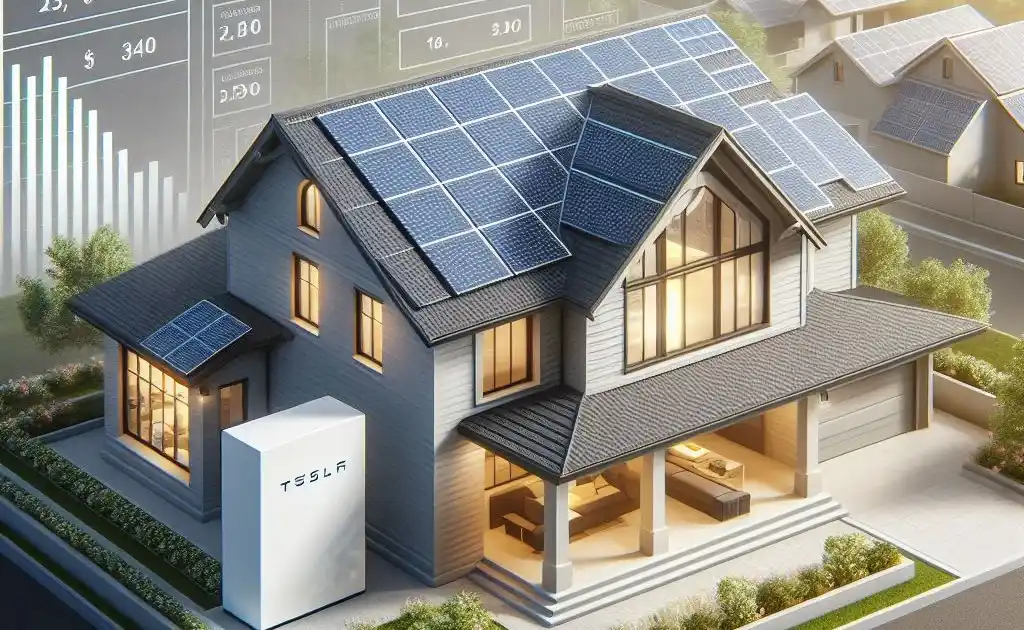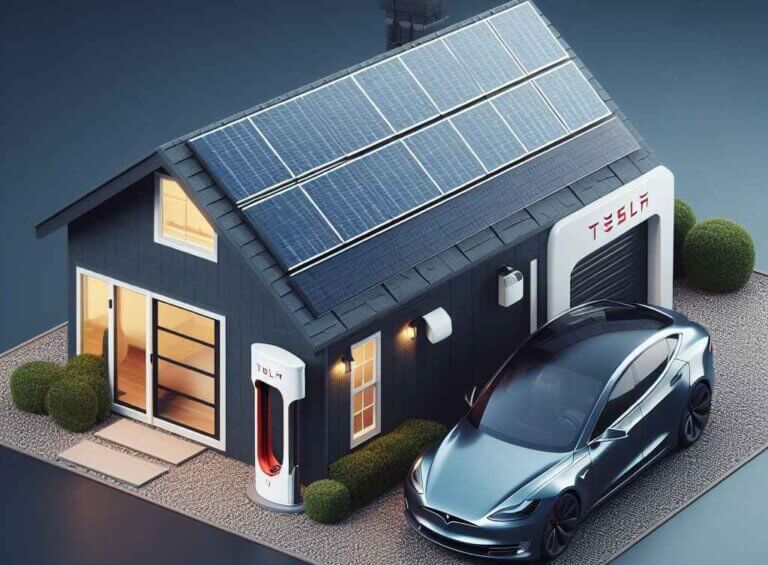Tesla Powerwall and Solar Panels Cost: Explore Combined Cost
A detailed overview of the costs, benefits, and ROI of installing Tesla solar panels and Powerwall home batteries.
Installing Tesla solar panels and a Powerwall battery is a significant investment that can pay dividends for decades through energy bill savings. This comprehensive guide provides a deep dive into Tesla solar and Powerwall costs, incentives, payback timelines, and more to help you decide if it’s the right home energy upgrade for you.
This detailed article covers the Tesla Powerwall and Solar Panels costs combined and separately with necessary details. From solar panel installation to Tesla powerwall system using Tesla Powerwall 2 and discussing federal solar tax credit is described in the article. So before finalizing the complete solar installation cost let’s start with why consider Tesla Solar Panels and Tesla Powerwall.
Table of Contents
Why Consider Tesla Solar and Powerwall?
Before jumping into the financial details, let’s quickly go over the main reasons homeowners decide to install a Tesla solar and energy storage system:
- Slash Electric Bills – Tesla solar panels can supply 30-100% of your home’s energy needs, reducing or even eliminating monthly electricity costs. The Powerwall stores surplus solar energy for nighttime use.
- Gain Energy Independence – Reduce reliance on the grid with your own solar power plant and battery backup during outages.
- Increase Home Value – Solar panel systems and batteries can increase resale value by 4.1% on average.
- Protect Against Rising Rates – Lock in low energy rates for decades and avoid utility rate hikes.
- Earn Tax Credits & Rebates – Federal, state, and local incentives can reduce the upfront cost by 26% on average.
- Help the Planet – Solar energy reduces your home’s carbon footprint.
Now let’s get into the financial nitty gritty.
Tesla Powerwall Costs
The Tesla Powerwall is a rechargeable lithium-ion battery designed to store solar energy and provide backup power. Here are the key details on Powerwall pricing:
- Base Price – $11,500 for a 14 kWh Powerwall+ unit. That comes out to around $821 per kWh of storage capacity.
- Additional Costs – Expect to pay around $1,000-$3,000 extra for supporting hardware, installation labor, permits, and any required electrical upgrades.
- Total Price Range – With all costs included, plan for a total Tesla Powerwall price of $12,500 to $16,500 depending on system size, location, and site-specific factors.
Tesla offers the Powerwall in three models:
- Powerwall+ (14 kWh capacity)
- Powerwall (13.5 kWh capacity)
- Low-kWh Powerwall (6.4 kWh capacity)
The mid-range 13.5 kWh Powerwall retails for $10,500 while the smaller 6.4 kWh model goes is listed at $7,500. All pricing is before installation.
You can install up to 10 Powerwall batteries for a total of up to 280 kWh of energy storage capacity, which could power an entire home off-grid. For most homes, 1-2 Powerwall units are ideal for increasing solar self-consumption and adding backup capacity.
Use our Powerwall Cost Calculator to estimate pricing for your specific needs.
Next, let’s break down the expenses associated with Tesla solar panels.
Tesla Solar Panel Cost
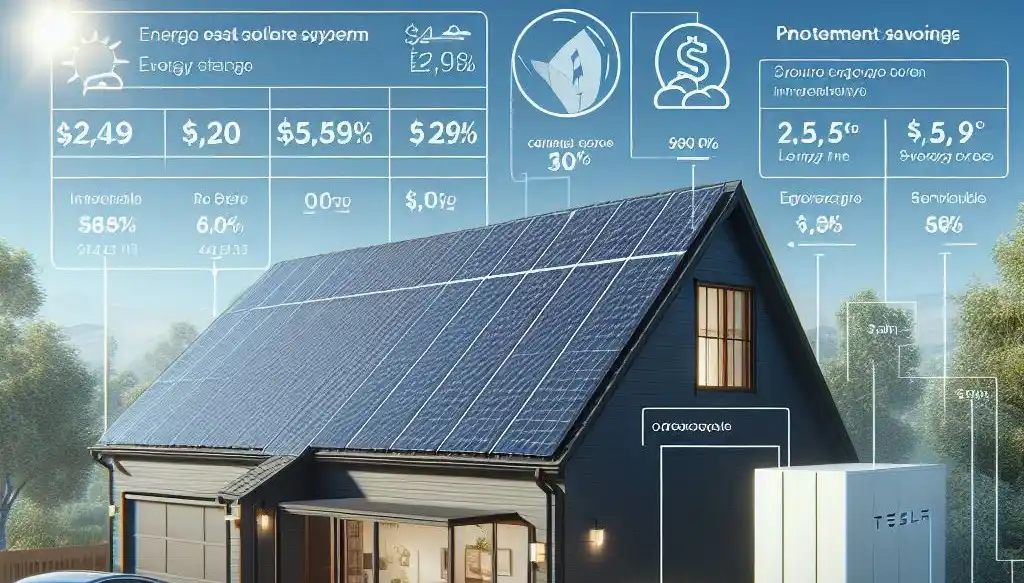
Tesla offers three high-efficiency solar panel systems designed for durability and optimized aesthetics:
- Tesla Solar Roof – Glass roof tiles with integrated PV cells, start at $33,950 for an average 2,000 sf home, or $2.01 per watt before credits & incentives.
- Tesla Solar Panels – Flush-mount panels starting at $2.01 per watt.
- Low-Profile Solar Panels – Attach directly to your roof starting at $1.82 per watt.
Pricing will depend largely on your energy needs, roof characteristics, and local labor rates. As a benchmark, the average total cost for a typical 6 kW solar panel system is $18,840 before incentives and $12,500 after the federal tax credit in the U.S. Pricing also varies significantly by state and local incentives.
Here are the main factors impacting Tesla solar panel pricing:
- System size – Measured in kW capacity
- Roof type – Tile, shingle, flat, etc.
- Roof angle & sun exposure
- Electricity usage & goals – Offset 50%? 100%?
- Location – Labor & permit costs differ
- Equipment needs – Inverters, racking
- Site conditions – Shading, roof repairs
- Financing terms – Cash, loan, lease
- Net metering policies
- Federal, state & utility incentives
Tesla provides remote solar assessments based on the roof measurements you provide. This includes a custom quote detailing panel production estimates, energy bill savings, incentives, and 25-year cost/benefit projections.
Tesla Powerwall and Solar Panels Cost: Combined Costs
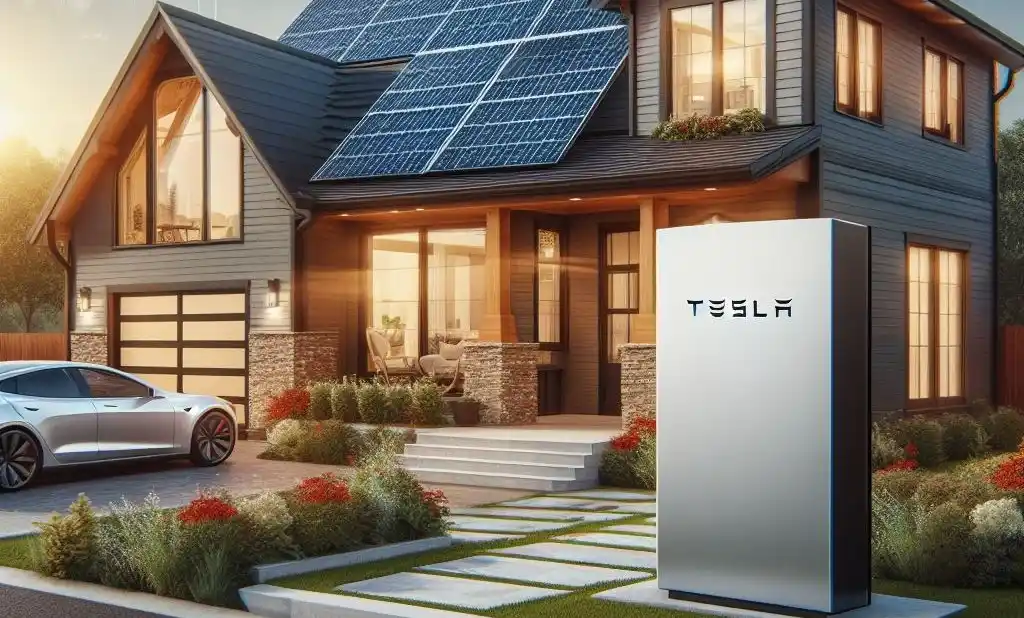
When installing Tesla solar panels and Powerwall together as an integrated system, you can expect:
- Complete Cost – Both Tesla Powerwall and Solar Panels Costs range from around $25,000 to $50,000 for a typical single Tesla Powerwall + mid-size Tesla Solar Panels array after credits and incentives.
- Bundled Discount – Tesla often offers a $500 discount per Powerwall when bundled with solar panels.
- Efficiency Benefits – The integrated Powerwall+ inverter maximizes solar energy use, payback timeline, and resiliency.
Many homeowners choose to stagger the installations by 6-18 months to spread out costs. Note that additional electrical upgrades may be required when adding power to an existing solar array. Always consult a professional installer first.
Incentives & Rebates
Various federal, state, and local incentives can drastically reduce the out-of-pocket costs of installing solar panels and home battery systems.
The biggest solar incentive is the federal Investment Tax Credit (ITC):
- Covers 26% of total system costs if installed by the end of 2022, then drops to 22% in 2023.
- Can be applied to both solar and battery storage systems.
- Applies to principal residences and second homes.
- Carries forward – no expiration.
Beyond the ITC, many states and utilities offer additional solar, storage, and electric vehicle charging incentives such as:
- Rebates
- Performance payments
- Renewable energy credits
- Property tax exemptions
- Sales tax exemptions
- Net metering
Use our Solar Incentive Finder to check available incentives in your state:
With the 26% federal tax credit plus state/local rebates, your net out-of-pocket expense can be 50% less than the gross system cost.
Tesla Solar & Battery Financing
Tesla provides several solar and battery financing options including:
- Cash Purchase – Single payment, but higher ITC.
- Loan – 100% financing at competitive rates.
- Lease – Zero down, pay monthly with the option to buy out.
- Power Purchase Agreement – Pay per kWh without buying the system.
When calculating ROI, be sure to factor in all incentives, financing terms, and effects on your income tax liability. Our Tesla Solar Calculator lets you model different scenarios to optimize payback.
Next, let’s review average cost breakdowns and total ROI timelines.
Powerwall Battery Return on Investment
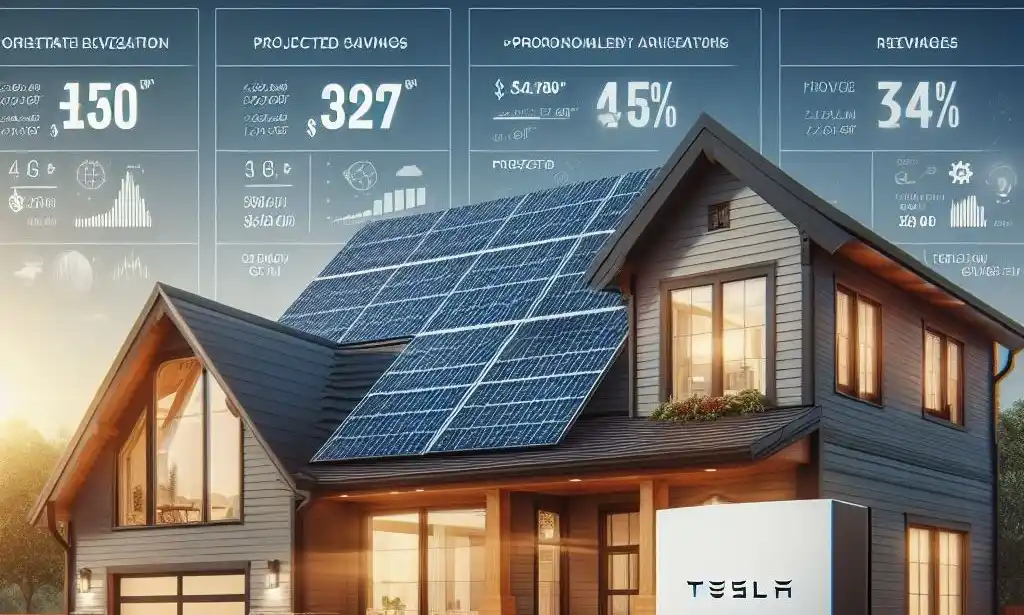
Assuming the average Tesla Powerwall cost of $14,000 installed, how long does it take to recoup your investment from energy savings?
- Utility Bill Savings – Around $150 per year, depending on energy rates and usage factors [source].
- Payback Time – Approximately 25 years to break even through bill savings alone [source].
- System Life – Powerwalls are warranted for 10 years and designed to last 15+ years with reasonable performance degradation.
- Resale Value – Currently unknown, but potentially $5,000 based on recyclable materials alone if batteries cannot be refurbished.
So while Powerwalls may not pay for themselves through energy cost reduction alone, adding backup power and resiliency has value. The batteries can significantly improve ROI when coupled with solar panel systems.
Tesla Solar Panel Return on Investment
Reviewing the key factors impacting Tesla solar panel system ROI:
- Gross Cost – $15,000 to $25,000 for a typical home grid-tied solar array before incentives.
- Net Cost – As low as $5,000 to $15,000 after tax credits & incentives.
- Savings – Reduce electric bills by 50% to 100% each year. At average retail electricity rates, that equates to $1,100 to $1,500+ in annual savings for a 5 kW system.
- Payback – With incentives, ROI ranges from 3-7 years for most systems compared to 25+ years without solar [sources].
- System Life – Tesla solar panels and Powerwalls are warranted for 25 years. Useful life is expected to reach 30-35 years.
- Resale Value – Homes with solar power can sell for up to 4.1% more nationwide [source]. This varies greatly by local market conditions.
When factoring the total cost savings over the 25-35 year lifespan, Tesla solar panels deliver 25x to 30x return on investment compared to grid-only electricity costs.
Key Takeaways: Tesla Solar & Battery Costs
- Expect to pay $14k – $17k for a single Powerwall installed. Each additional battery adds $11k – $14k.
- Total solar panel system costs average around $3-$4 per watt, or $18k for a typical 6 kW install.
- Bundling Powerwalls with solar panels qualifies for a $500 per battery discount from Tesla.
- Federal, state, and utility incentives can reduce net out-of-pocket costs by 50% or more.
- Tesla solar panels pay for themselves through utility savings within 4-7 years on average.
- Powerwalls have a 25+ year ROI, but provide backup capability and maximize solar usage.
- Combined storage systems deliver optimal economics, resiliency, and environmental benefits.
Interested to learn if Tesla systems are right for your home? Contact a Tesla Certified Installer for solar and battery estimates tailored to your needs.
Frequently Asked Questions
How much does a 7 kW solar system cost from Tesla?
A 7 kW Tesla solar panel system costs roughly $18,000 to $28,000 before incentives depending on site-specific factors. The federal tax credit and additional state/utility rebates can reduce net out-of-pocket costs to $10,000 – $15,000.
What is the cost per kWh for a Tesla Powerwall?
A 14 kWh Tesla Powerwall+ retails for $11,500 plus supporting hardware and installation, so about $821 per kWh. Total costs for a fully installed battery system average around $1,100 – $1,200 per usable kWh.
Can you buy and install a Tesla Powerwall on its own?
Yes, Tesla Powerwalls can be purchased independently without solar panels. But combining them maximizes ROI through increased self-consumption of your free solar energy.
Does home insurance cover Tesla Powerwall?
Most home insurance providers allow Tesla Powerwalls but may raise rates or require an additional rider. Compare rates from solar-friendly insurance companies before installing a home battery.
How long does a Tesla solar system last?
Tesla solar panels and Powerwall batteries are warranted to retain high performance for 25 years. The expected useful lifespan is 30-35 years. The inverter may need replacement after 10-15 years.
Takeaway
Investing in a Tesla solar and/or energy storage system can provide decades of free renewable power and electric bill savings. While batteries are more difficult to justify on ROI alone today, they enable greater energy independence and optimize the use of home solar generation. By leveraging incentives, Tesla systems can pay for themselves in energy savings within 4-7 years while increasing home value and reducing environmental impact.
Conclusion
We’ve covered all the key details on Tesla Powerwall and solar panel system pricing. While Tesla products demand a premium upfront investment, they can pay significant dividends over their 25+ year lifespan.
Combining solar PV with home battery storage provides optimal economics alongside energy security and sustainability. As electricity rates and battery costs continue evolving over the next decade, Tesla’s integrated approach will only become more compelling.
To determine if Tesla Solar and/or Powerwall can deliver value for your specific home and needs, connect with a Tesla Certified Installer for quotes and complete cost/benefit analysis.
They can assess your property, energy goals, and financing capacity to design a custom system maximizing your savings. Investing in renewable energy and energy storage helps secure your financial future while moving towards a carbon-free grid.

